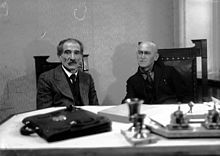The Yevsektsiya – then and now?

JVL Introduction
A recurrent strain of anti-JVL propaganda, especially from supporters of the so-called Jewish Labour Movement, has centred on comparing JVL to the Yevsektsiya – the Jewish section of the Communist Party of the Soviet Union in the 1920s.
The comparison has no validity – but see below.
The Yevsektsiya – then and now?
From our special correspondent
21 April 2019
A recurrent strain of anti-JVL propaganda, especially from supporters of the so-called Jewish Labour Movement, has centred on comparing JVL to the Yevsektsiya – the Jewish section of the Communist Party of the Soviet Union in the 1920s.
The most recent example of this genre was an article by Colin Shindler in the Jewish Chronicle on 4 April.
The comparison is bizarre to say the least. The political positions of the Yevsektsiya are not to my knowledge advocated by any organisation anywhere in British politics today. But if there is a parallel to it, it is the so-called ‘Jewish Labour Movement’.
The Yevsektsiya was founded in 1918 as a Yiddish-language section of the CPSU for the purpose of conducting party propaganda among the Jewish masses. It advocated a secular Jewish identity based on the Yiddish language within the framework of Soviet nationality policy and Soviet-style socialism.
Superficially this may seem similar to the secular Yiddishist autonomy within a socialist framework promoted by the Bund – from which indeed many of the initial cadre of the Yevsektsia were recruited.
But the Bund – both in pre-revolutionary Russia, and in 1919-39 Poland – were pluralists and democrats, who never sought to impose their particular concept of Jewish identity on others; whether Orthodox and other believers, Zionists, secular assimilationists or non-socialist autonomists.
The Yevsektsiya by contrast were the official and only Jewish face of a monopolistic ruling party in a one-party state. They actively participated on behalf of the CPSU in actually suppressing the organised expression of any other form of Jewish identity, closing down synagogues and yeshivas (rabbinical seminaries) and other Jewish political parties including Bundists, autonomists, and Zionists.
Indeed their anti-religious zeal was such as sometimes to provoke reprimands from the wider Communist Party who feared the Yevsektsiya’s activities were unnecessarily alienating the Jewish masses.
Clearly this has nothing in common with Jewish Voice for Labour. We couldn’t be Labour’s Yevsektsiya even if we wanted. We fall at the first hurdle as we do not have a single definition of Jewish identity to impose on others in the first place. We include observant kippa-wearers, a trainee rabbi, the neo-Bundists of the JSG, two-staters, one-staters, non-state zionists. those who feel zionism took a wrong turning, and other who feel it was mistaken from the start.
We believe Labour should treat its Jewish members on a level footing with the provision it makes for its Irish, BAME and LGBT members through a facility open to all on the basis of self-identification, without some exclusive ideological test.
JLM by contrast is only open to those who accept one particular definition of Jewish identity with Israel as its centre and a commitment to the specific ideology of ‘Labour Zionism’. They insist on maintaining their claim to a monopoly of Jewish representation within the Labour Party and denounce Jewish dissenters as ‘self-haters’ or ‘antisemitism deniers’ just as vigorously as the `Yevsektsiya denounced all those with a different view of Jewish identity as ‘reactionaries’ and ‘counter-revolutionaries’.
Fortunately Labour is a pluralist party, and the centralising trend at work under Blair is in the process of being reversed under the ‘Leninist’ and ‘Totalitarian’ Jeremy Corbyn. There is now no vacancy for a single ideologically monolithic official Labour Yevsektsia. But to be fair, the JLM does differ from its unfortunate Soviet predecessor. To join you do not have to be Jewish – or even a member of the Party.
